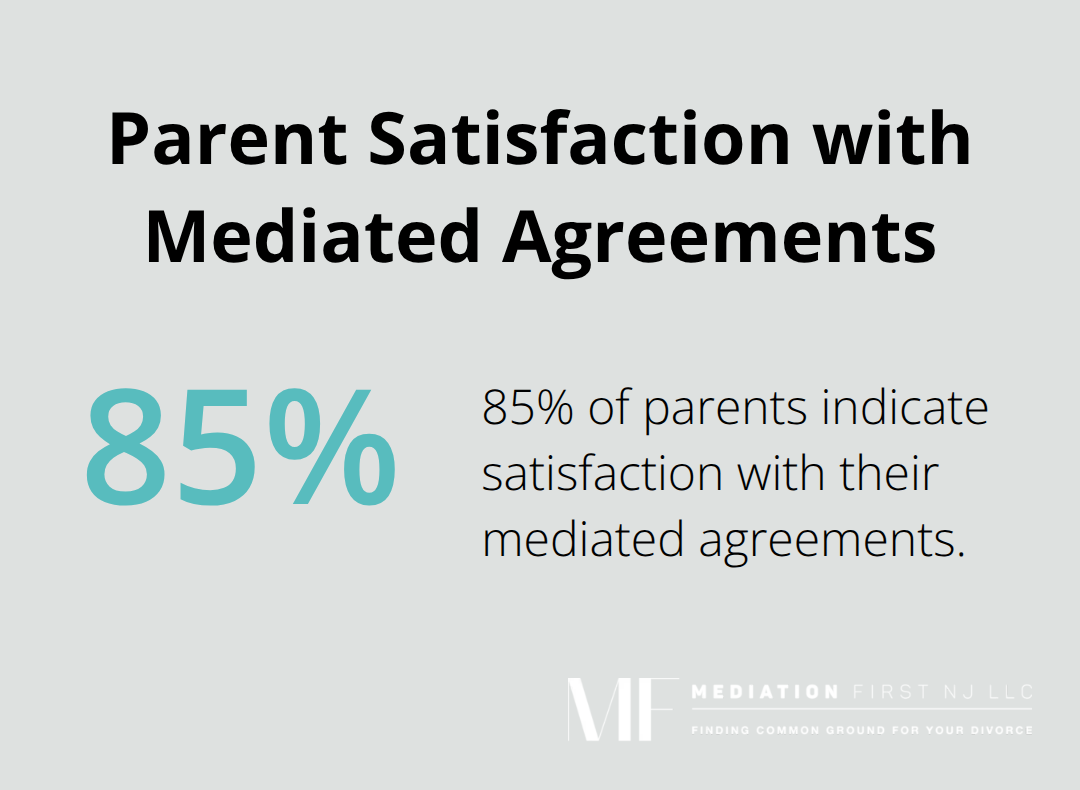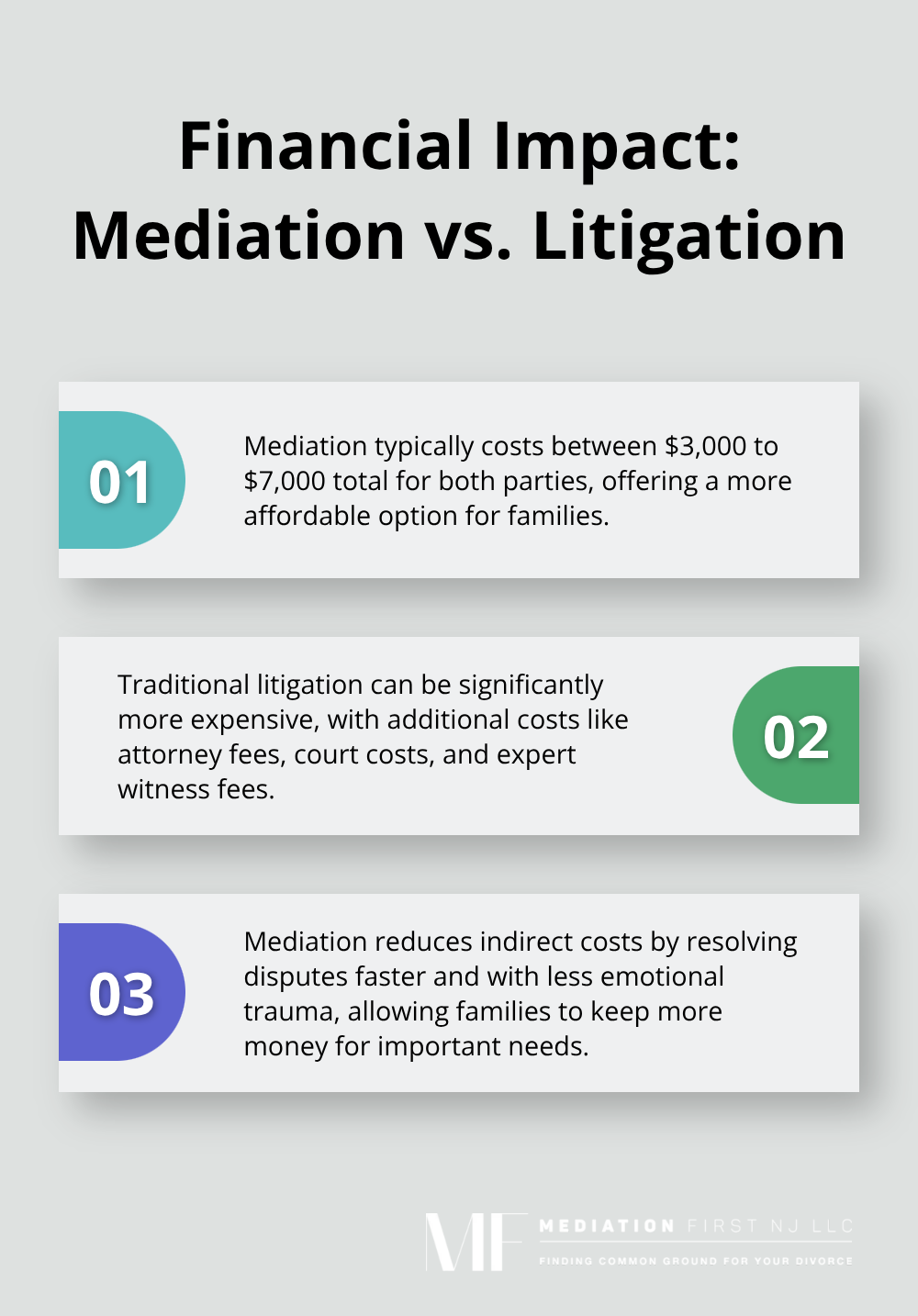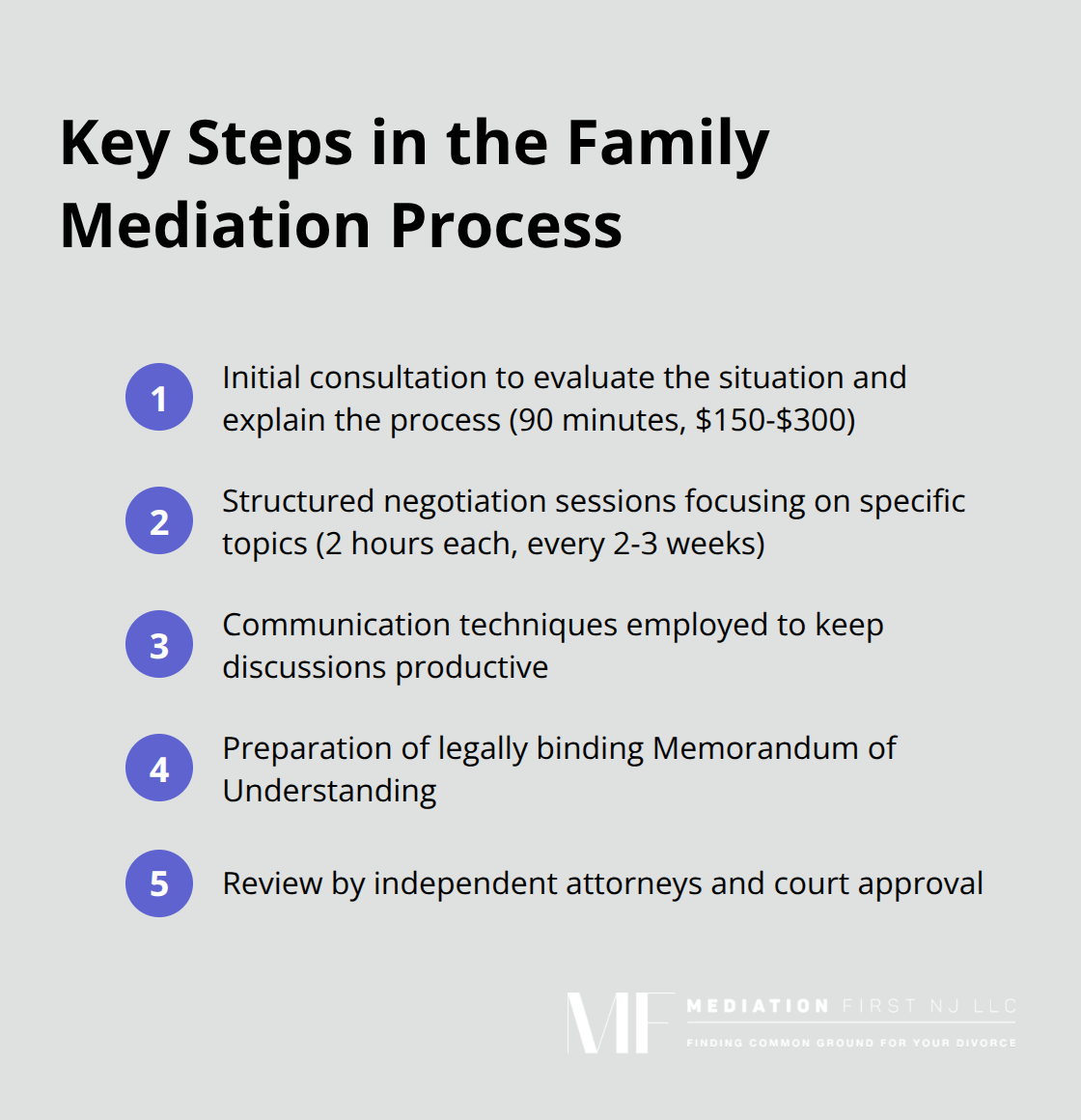Family conflicts can tear relationships apart and create lasting emotional wounds. Traditional court battles often make these situations worse by forcing families into adversarial positions.
We at Mediation First NJ LLC believe family mediation services offer a better path forward. This collaborative approach helps New Jersey families resolve disputes while preserving important relationships and reducing both financial and emotional costs.
How Does Family Mediation Work in New Jersey
Family mediation transforms how New Jersey families handle disputes by replacing courtroom battles with structured conversations led by a neutral mediator. Both parties meet with a trained professional who facilitates discussions about property division, child custody, support arrangements, and other family matters. The mediator guides conversations but never makes decisions for the family – that power remains entirely with the participants. New Jersey courts actively support mediation through complementary dispute resolution programs, recognizing that 85% of parents indicate satisfaction with their mediated agreements.

What Disputes Get Resolution Through Mediation
New Jersey families use mediation for divorce proceedings, child custody modifications, parenting time disputes, spousal support disagreements, and property division conflicts. Post-divorce issues also find resolution through mediation, including changes to custody arrangements and support modifications. The state’s no-fault divorce laws, which allow couples to cite irreconcilable differences, make mediation particularly effective since blame becomes irrelevant. Research shows that less than 10% of mediated cases require additional litigation, proving this approach works for most family situations.
New Jersey’s Legal Requirements and Framework
New Jersey follows equitable distribution laws during divorce, meaning fair but not necessarily equal division of marital assets. Child support calculations use established formulas based on income and parenting time rather than fault or misconduct. The state prioritizes children’s best interests in all custody decisions, making mediation’s collaborative approach particularly valuable. Mediators must complete specialized training and certification to practice in New Jersey, with ongoing education requirements to stay current with family law changes.
Court-Ordered vs Private Mediation Options
Court-ordered mediation differs from private mediation in confidentiality rules and initiation processes, but both options provide families with alternatives to traditional litigation. Private mediation offers greater flexibility in scheduling and process customization, while court-ordered mediation follows specific procedural requirements. Both approaches maintain the same core principle: empowering families to reach their own agreements rather than having decisions imposed by a judge.
The structured nature of mediation creates an environment where families can address their specific needs while working toward solutions that benefit everyone involved.
Why Choose Mediation Over Court Battles
Divorce litigation costs New Jersey families significant amounts, while mediation typically runs between $3,000 to $7,000 total for both parties. Court battles drain resources through attorney fees, court costs, expert witness fees, and lengthy discovery processes that can stretch for months or years. Filing fees for divorce in New Jersey generally amount to around $300, with an additional $25 fee if there are children involved. Mediation eliminates most litigation expenses and streamlines the process while reducing professional service hours needed.

Financial Impact Beyond Legal Fees
Traditional litigation creates hidden costs that devastate family budgets. Court proceedings require time off work for hearings, depositions, and attorney meetings. The American Psychological Association found that high-conflict divorces increase medical expenses by 23% due to stress-related health issues. Mediation reduces these indirect costs because it resolves disputes faster and with less emotional trauma. Families keep more money for their children’s education, housing needs, and life reconstruction instead of funding prolonged legal battles.
Speed and Scheduling Control
Mediation in New Jersey can help parties reach solutions without going to court, while traditional litigation averages 12 to 18 months according to state court statistics. Private mediation moves even faster because families control the schedule rather than wait for available court dates. Sessions can happen during evenings or weekends to accommodate work schedules (something impossible with court proceedings). The majority of mediated agreements reach completion within six sessions, which gives families certainty about their timeline and allows them to move forward with their lives.
Complete Privacy Protection
Court records become public documents accessible to anyone, and they expose personal financial information and family disputes permanently. Mediation discussions remain completely confidential under New Jersey law, which protects sensitive details about income, assets, and parental concerns from public scrutiny. This privacy proves particularly valuable for business owners, professionals, or anyone who wants to shield their children from public exposure of family conflicts. Confidentiality also encourages honest communication during sessions and leads to better outcomes for everyone involved.
These advantages make mediation an attractive option, but success depends on how well families prepare for and navigate the actual mediation process.
What Happens During Family Mediation Sessions
Family mediation begins with a comprehensive initial consultation where the mediator evaluates your specific situation and explains the process thoroughly. We at Mediation First NJ LLC conduct these sessions to assess whether mediation fits your family’s needs and circumstances. The mediator reviews basic information about assets, debts, children, and primary concerns while establishing ground rules for future sessions. This first meeting typically lasts 90 minutes and costs between $150 to $300 according to New Jersey mediation standards. Most families know within this initial session whether mediation will work for their situation.

Structured Negotiation Sessions Drive Results
Active mediation sessions follow a proven format that maximizes productive communication and minimizes conflict escalation. Each session runs approximately two hours and focuses on specific topics like property division, custody schedules, or financial support arrangements. The mediator uses structured communication techniques including active listening exercises, I-statements instead of accusatory language, and the 5-3-1 method for narrowing down solutions (where families brainstorm five options, select three favorites, then choose one final solution). Sessions happen every two to three weeks to allow processing time between meetings. Most New Jersey families complete their mediation within four to eight sessions, depending on complexity and cooperation levels.
Communication Techniques That Work
Professional mediators employ specific strategies to keep discussions productive and prevent emotional escalation. They create safe spaces for dialogue with clear guidelines like no interrupting or name-calling during conversations. Mediators encourage empathy and validation by acknowledging emotions without necessarily agreeing with positions. They help families identify root causes of conflicts rather than just surface-level disagreements. Time-outs during heated discussions allow for emotional cooling and promote thoughtful reflection before re-engaging in dialogue.
Legal Documentation Seals Your Agreement
The final mediation phase transforms verbal agreements into legally binding documents that courts will recognize and enforce. Your mediator prepares a comprehensive Memorandum of Understanding that details every aspect of your settlement including asset division percentages, custody schedules, and support payment amounts. This document gets reviewed by independent attorneys before submission to the court for final approval. New Jersey does not require a waiting period before a divorce can be finalized, but mediated agreements rarely face court challenges because both parties participated in creating them. The entire documentation process typically takes two to four weeks after your final mediation session concludes.
Final Thoughts
Family mediation services provide New Jersey families with a practical alternative to costly court battles. The evidence speaks clearly: mediation costs 70% less than litigation, resolves disputes in months rather than years, and maintains complete privacy throughout the process. Nearly 85% of families report satisfaction with their mediated agreements, while less than 10% require additional litigation afterward.
Mediation works best when both parties want to avoid adversarial proceedings and prioritize their children’s wellbeing. Families who deal with divorce, custody modifications, or support disputes find this approach particularly effective. The collaborative environment allows creative solutions that courts cannot provide while it preserves relationships needed for successful co-parenting.
Success requires commitment from both parties to communicate respectfully and work toward mutually beneficial outcomes. If you value control over your family’s future, want to protect your privacy, and prefer constructive problem-solving over courtroom confrontation, mediation offers the path forward. Mediation First NJ LLC specializes in guiding New Jersey families through this process with professional expertise and compassionate support (taking that first step toward peaceful resolution starts with a simple consultation to explore whether mediation fits your situation).

